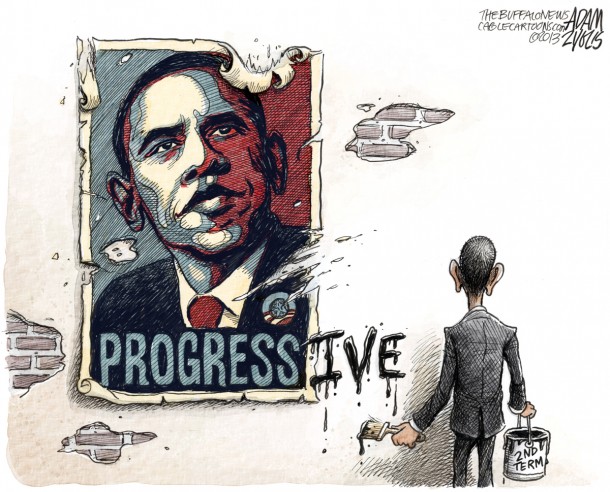(Image courtesy of the Buffalo News)
Barry Friedman and Dahlia Lithwick, writing at Slate, inquire whether progressivism has abandoned every cause except gay marriage. I would argue, paraphrasing Twain, that rumors of progressivism’s demise are exaggerated.
Rather than a retreat from principles, progressivism is experiencing a period of transition. The largest attack on U.S. soil since Pearl Harbor, more than a decade of foreign wars, the greatest financial crisis since the Great Depression, and the election of the nation’s first black president have all created shock waves reverberating throughout the political spectrum. Any political movement that did not evolve in the face of such disruptions would truly be moribund.
If there is any doubt that the current season of uncertainty is systemic, look at the other side of the aisle. Electoral gains in 2010 notwithstanding, all is chaos and confusion within the precincts of conservative politics. Progressives may be renegotiating priorities, but the left is surely not in the state of disarray exemplified by the Republicans. If conservatives had been able to agree on an agenda more original than “cut taxes, cut spending, privatize services,” the election would not have been carried by the Democrats so cleanly, if at all.
| We won’t know if President Obama is a “transformative president” until a Republican sits in the White House again. How much change takes place in the interval depends on the depth of political will that progressives bring to bear. |
Even so, Friedman and Dahlia serve the progressive cause well by raising questions. We live in the midst of an historic sea change; the nation is gripped by a sense of crisis and looking for leadership. If progressives can not creatively rethink their values and priorities, the moment will be abdicated to whichever groups are better funded and more stridently vocal.
With this caveat in mind, I would offer these prescriptions for “the progressive movement.”
Revival of the middle class should be priority No. 1
Friedman and Lithwick deplore the left’s “abandonment” of signature issues of days past such as reproductive freedom and the end of the war on drugs. As Arthur Goldwag notes, however, progressives care just as much about these issues as they ever did. What has changed is not the ethos of progressives, but the state of policy and politics. The nation is confronted with new and serious existential threats; a sense of crisis prevails that calls for broad solutions.
For progressives to appear with a laundry list of particular and mutually unconnected demands would be a road map toward political irrelevance. If progressivism is to be a dynamic force, progressives need to present an integral program and set of principles. They must stand for something, an alternative path beyond our present dangers and toward a better future.
This naturally raises the question of which goal is at the heart of the progressive agenda: the alleviation of which problem will have the most beneficial repercussions, producing the most outcomes expressive of progressive values and aspirations? In this regard, the crisis of massive and accelerating economic inequality stands alone. Deregulation and defunding of the public sector have led to a massive shift of wealth and purchasing power up the income scale. A host of ills arise from, or are exacerbated by, this new Gilded Age inequality: the growth of poverty, the erosion of public education, the deterioration of the environment, the corruption of the financial system, the hamstringing of the political process. Even foreign terrorism is fueled by policies initiated to protect corporate profits, and causes such as marriage equality and reproductive freedom are impacted as the upward flow of resources deepens the asymmetry between corporate political manipulation and grass-roots activism.
Arresting and reversing this flow of wealth should be the central focus of the progressive agenda for the near term. The growth of the public sector in line with population must be restored, public infrastructure and services must be revived, and tax rates must be correspondingly adjusted. The trend of privatization should be reversed, and the rights of trade unions, both private and public, should be defended and restored.
In other words, as Goldwag noted, progressives must openly embrace the redistributive function of government.
The politics of this position have been vexed in the past, as during the bizarre “Joe the Plumber” interlude that gripped the 2008 campaign when then-candidate Barack Obama had the temerity to utter the words “spread the wealth.” Nothing has political force like the truth, however, and the truth is that what is at stake is the continued existence of the American middle class.
We have a choice to make as a nation. We can continue to slide into a state of deepening squalor and fragmentation, where all of us, even the wealthy, endure a progressively meaner and more parsimonious existence. Alternatively, we can travel down the road to shared and expanding prosperity, as has been the grand tradition of our Republic.
If progressives clearly understand and engage that imperative, there is little fear that progressivism as a movement will flourish, or that the nation will thrive as a result.
We must have energy modernization
A focus on inequality alone will not suffice to secure progressive leadership or achieve progressive goals. While distributing purchasing power to a broader segment of society will create wealth, it will not undo the damage of conservative mismanagement, nor will it meet the challenges the economy faces. Simply returning to the New Deal or the Great Society would not constitute genuine leadership, and would be rejected by the electorate.
History teaches us, moreover, that government succeeds best at harnessing and distributing resources, in practical and political terms, when it is mobilized for a discrete and focused mission. Defeating fascism gave the government the wherewithal to end the Great Depression and lay the foundation of the expanded middle class with the GI Bill. The space race facilitated the public funding of new technologies that led to the digital revolution. If progressives are going to utilize government to improve social conditions, they must rally around the single crucial policy initiative through which government can make the greatest positive impact.
With health care reform having seen modest success and in a holding pattern, the next clear imperative is energy modernization. Like wealth inequality (with which it is inextricably linked), our profligate and detrimental energy regime is central to a host of critical threats: climate change, environmental degradation, economic stagnation, foreign terrorism. Redressing this problem, moreover, is a task that private markets are not equipped to solve.
Just as private capital, with its focus on short-term profit, would never on its own have created the intercontinental railway or the Apollo lunar missions, private corporations can not be relied upon to make the kind of broad-scale and long-term investments needed to transition over to a more efficient and sustainable energy regime. Intensive research yet needs to be done; massive changes to the electrical grid and transportation system will need to be engineered. All of these improvements will yield enormous benefits, but they may not pay out cash profits for decades.
Private capital may be enlisted to assist in such a long term venture, but only government can marshal the resources and manpower needed to achieve success. This is an instance where, to once again cite Arthur Goldwag (quoting Milton Friedman) “the price system could not perform.”
The experience of the Affordable Care Act demonstrates that progressives must focus their efforts on a single policy initiative to overcome powerful forces obstructing change. Energy modernization clearly ranks first in this regard, as the stakes are so extraordinarily high.
The U.S. is not alone in fighting to expand the middle class. India, China, Brazil, and many others will be following suit much more rapidly and on a much larger scale. Unless the technology to make a middle-class lifestyle more sustainable is invented and implemented, the planet will perish. If progressives commit all of their political capital to broadcasting and acting upon that principle, they will enjoy the momentum of those advancing along the downward slope of history.
We must fully and openly own our principles
Many progressives might complain that this focus on economic issues pays insufficient attention to problems of social justice and personal oppression. Though closing income gaps and broadening prosperity will alleviate racism, sexism, and homophobia to some degree, the effect will necessarily be indirect and slow to mature. Direct action on these fronts should not be sacrificed for some perceived “greater good.”
But this sort of “zero sum” reasoning misunderstands the nature of the political process. There is no reason that progressives must cease fighting for reproductive freedom, immigration reform, marriage equality, and racial fairness. Each of these struggles will necessarily progress along different timelines, however, and will require different kinds of action and sacrifice. A problem that was once effectively redressed through legislation may today best be approached with grass-roots activism, while another that previously had only been the focus of cultural protest may now, under new circumstances, invite an aggressive campaign for institutional reform.
Through all these changes, there is only one sort of leadership that elected progressives might consistently provide for the cause, and it is one in which they have been unfortunately remiss in recent decades. Whatever the current state of policy, progressive leaders can always use the bully pulpit of public office to articulate values and principles for the electorate at large.
Since the days of Reagan, however, progressives have allowed conservatives to set the terms of discourse, so that politicians on the left are consistently caught in a web of euphemisms and verbal triangulations. It is so rare to hear a progressive elected official speak candidly about why she supports, say, reproductive freedom or opposes racial profiling, that when President Obama did so for 16 minutes in a press briefing it set off a minor media earthquake.
This tendency toward self-censorship and reticence is patronizing to the electorate and subversive of the progressive cause. Politicians can only lead if they are willing to engage in an open and substantive discussion about basic principles. Lampooning Republicans for their regressive views will never suffice to effect change. Many voters may agree, for example, that to force a woman to bear a rapist’s child because it is “God’s plan” is a silly notion, but they will give the person who avers it the credit of having the courage of his or her convictions. Unless progressives can candidly and sincerely articulate values and principles to counter those posited by the right, they stand little chance of effecting actual policy of any kind.
We must resist defeatism and Manicheism
Progressives are often their own worst enemies, and if the opportunity to lead is to be seized we must rise above historical weaknesses. Defeatism is an ever-present hazard because of the inherently conservative nature of the American system. The founders of the Republic designed our institutions so that change would be both difficult and gradual, and so that proprietary interests would have a disproportionate share of power.
In the face of those conditions, progress is only ever achieved through long struggle against powerful opposition, and may occasionally entail painful compromise. Anyone who declares that “progressivism is on the ropes” is thus singing a very old song. Those who wish to serve the solution rather than the problem should take care not to undermine morale.
Paired with defeatism is a tendency toward political Manicheism. Politics is a messy business, and the political field rarely divides up into groups as neatly delineated as “progressives” and “conservatives.” If anything like a progressive coalition is to form, progressive individuals must be tolerant of one-another’s idiosyncrasies and differences of opinion.
Most importantly, we must resist the tendency to abandon political leaders, especially successful ones, if they fall short of some perceived progressive ideal. Progressive change is a journey, not a destination. Setbacks and reversals are inevitable given the nature of our system and the inherently oscillatory nature of our national politics.
Bruce Bartlett, a former Reagan advisor, predicts that liberalism is poised for a revival. I would agree with him, though I would posit that the revival is already ongoing in ways that he and even many progressives may not perceive. Bartlett states confidently that “it is obvious that [Barack Obama] has not been a transformational president” in the manner of Ronald Reagan. Many progressives would no doubt nod sadly in accordance with this judgment, but I would argue that such reflexive assent is the kind of defeatism and Manicheism I warn about.
It was not apparent during Reagan’s tenure how transformational his presidency had been. The degree to which he had changed American politics only became clear when Bill Clinton came into office. In the same way, the impact Barack Obama has had on the nation will only be visible the next time a Republican sits in the White House. How far off that will be, and how much change takes place in the interval, depends entirely on the quality of leadership and the depth of political will that progressives bring to bear.
Andrew Meyer is associate professor of history at Brooklyn College. His most recent book is The Dao of the Military: Liu An’s Art of War.







0 Comments